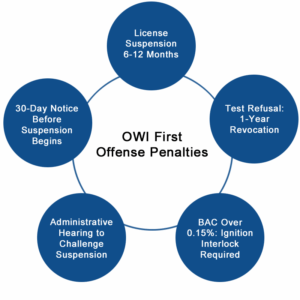First Offense Penalties in Wisconsin OWI

Table of Contents
01. OWI / APC Defined
02. Tickets for Impaired Driving (A, B, AM)
03. First Offense as a Civil Infraction
04. Consequences for a First Offense
05. License Suspension
06. Refusing Testing: Revocation
07. Taking Tests: Suspension
08. Challenging the Suspension (Administrative Hearing)
09. Other First Offense Consequences
10. Permanent Record Implications
11. Jail Time Exceptions
12. First Offense Fines
13. Ignition Interlock Device (IID) Requirements
14. Alcohol & Drug Assessment (AODA)
15. Occupational / Restricted License
16. Driver’s License Reinstatement & Fees
17. CDL Drivers & OWI
18. Out-of-State OWI Impacts
19. OWI for Drivers Under 21
20. Alternatives to Conviction
21. Winning Strategies for First-Offense OWI Charges in Wisconsin
22. OWI First Offense FAQs
23. Schedule a Free Legal Consultation
In Wisconsin, operating a vehicle while under the influence of alcohol or drugs is legally called Operating While Intoxicated (OWI), and in some cases it may also be charged as Actual Physical Control (APC). With an OWI, the state must prove that you were driving or operating the vehicle on a public road and that you were impaired by alcohol or drugs, or that your blood alcohol concentration (BAC) was over the legal limit. BAC is calculated through chemical testing of your breath, blood, or urine, with the legal threshold set at 0.08% for most drivers and 0.02% if you have three or more prior OWIs.
APC is different because the state does not need to prove you were actually driving. Instead, they only need to show that you were in control of the vehicle, such as being in the driver’s seat with the keys in the ignition, while under the influence. The key difference is that OWI focuses on actual operation of the vehicle, while APC focuses on the ability and control to operate it, even if the vehicle never moved.
Tickets for Impaired Driving in Wisconsin
You could face different types of tickets depending on the situation:
A Ticket: Accused of operating a vehicle while impaired by alcohol or drugs.
B Ticket: BAC at or above the legal limit, even if you did not appear impaired.
AM Ticket: A restricted controlled substance, such as certain drugs, was found in your blood.
Police can require you to provide a breath, blood, or urine sample to test your BAC. If you refuse, they can obtain a warrant to draw your blood, and you will also face license revocation under Wisconsin’s Implied Consent law. In short, an OWI stop can result in different tickets based on impairment, BAC levels, or drug use, and refusing testing only adds more serious consequences.
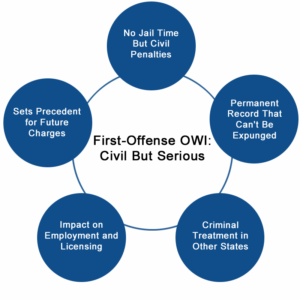 Although a First-Offense OWI Is a Civil Infraction, It Comes with Major Implications
Although a First-Offense OWI Is a Civil Infraction, It Comes with Major Implications
In Wisconsin, most first-offense OWI or APC cases are treated as civil infractions rather than criminal offenses. This means you will not face jail time for the first offense alone, and it will not appear as a criminal conviction on your Wisconsin record. Instead, the penalties are civil in nature, including fines, license suspension, mandatory alcohol assessments, and significantly higher insurance premiums. While being classified as civil may sound like a benefit, the reality is more complicated. The advantage is that you avoid jail time and the stigma of a criminal conviction, which can be important for employment and professional opportunities. However, the downside is that the infraction still stays on your record permanently, cannot be expunged, and will appear on background checks conducted by employers, licensing boards, and insurers.
The implications can become even more serious if you move out of Wisconsin, since most other states treat a first-offense drunk driving charge as a criminal misdemeanor. Employers, government agencies, and professional licensing boards in those states may interpret your Wisconsin civil OWI as a criminal-level offense, which could limit job opportunities, professional licensing, and even housing applications. It also sets a legal precedent, so if you are ever arrested again, prosecutors will treat you as a repeat offender, and future charges become criminal with much harsher consequences. In short, while a first offense is technically civil in Wisconsin, its long-term consequences at home and in other states can be just as damaging as a criminal conviction. This is why most people who plan to have a prosperous career go ahead and challenge the OWI charge rather than simply accept it.
Consequences for an OWI First Offense
License Suspension
For most people, the hardest part of a first-offense OWI is losing the ability to drive. Without a license, you cannot legally drive to work, take your kids to school, or handle basic needs for yourself and your family.
If You Refuse the Tests
If you refuse a breath, blood, or urine test, you will receive a Notice of Intent to Revoke. This means that 30 days from the date on the notice, your license will be revoked for usually at least one year (it could be longer). Revocation is more serious than suspension because it lasts longer and comes with stricter consequences.
Suspension Period for Refusing Tests
In Wisconsin, refusing a breath, blood, or urine test under the Implied Consent Law results in harsher penalties than failing the test, including a 1-year license revocation and mandatory alcohol and drug assessment for a first refusal, a 2-year revocation for a second refusal within 10 years, a 3-year revocation for a third refusal within 10 years, and the possibility of an ignition interlock device or court-ordered sobriety program.
If You Took the Test
If you take a breath or blood test, you will receive a Notice of Intent to Suspend. This means that 30 days from the date on the notice, your license will be suspended. The notice also comes with a form that explains how you can request a hearing to try to fight the suspension.
Suspension Period If You Took the Test
If you take the breath or blood test and your result is 0.08% or higher, your license will be suspended for at least 6 months. If you blow 0.15% or higher, you will also be required to install an ignition interlock device in your car, even for a first offense. If you are under 0.08%, you may avoid an automatic suspension, but the police can still try to claim you were impaired based on their observations, such as the odor of alcohol, slurred speech, bloodshot eyes, or how you performed on field sobriety tests.
Challenging the First Offense License Suspension
For a first-offense OWI or APC, requesting an administrative hearing is one of the smartest and most valuable steps you can take. It gives you the opportunity to fight for your license so you can keep driving while your case is pending, but more importantly, it gives your defense attorney the chance to cross-examine the arresting officer, review the state’s evidence, and identify errors in the stop, testing, or procedures. When those errors are exposed, critical evidence can be thrown out, charges can be reduced, and in some cases, the entire case can be dismissed. You do not even need to appear at the hearing because I can attend on your behalf. The hearing not only protects your license but also strengthens your defense and improves your chances of achieving the best possible outcome in court. There is no downside to requesting it, and the potential upside is enormous.
Other First Offense OWI Consequences
OWI Permanent Record Implications
Most people realize that a first-time OWI in Wisconsin usually does not mean jail time, but what many do not understand is that it still leaves a permanent mark on your record. That record does not just stay in Wisconsin, it can follow you to other states across the United States. It can show up in background checks for jobs, affect your ability to adopt a baby, and even be considered in child custody decisions after a divorce. In short, the consequences of a first OWI reach far beyond the courtroom.
OWI Jail Time
In Wisconsin, a first OWI usually does not mean jail, but there are exceptions. If you have a child under 16 in the car, you could face up to 6 months in jail or longer if other factors apply. If you cause an injury, it can mean up to 30 days in jail or more. If someone is badly hurt, the penalty can be more than 12 years in prison, and if someone dies, it can be 25 years or even 40 if you already had an OWI. Repeat offenses also bring mandatory jail time. A second offense means at least 5 days in jail and up to 6 months or longer, a third means at least 45 days and up to a year or more, and by the fourth it is always a felony with the possibility of years in prison. In short, most first offenses avoid jail, but the penalties get much harsher with aggravating factors or repeat offenses.
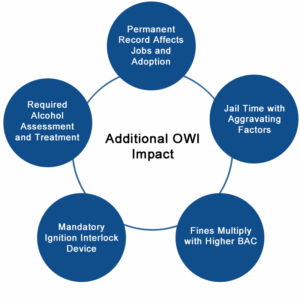 First Offense OWI Fines
First Offense OWI Fines
- • First OWI (no aggravating factor): $150 to $300 or more, plus court costs and surcharges.
- • First OWI with BAC over 0.15%: $300 to $500 or more, plus court costs and mandatory Ignition Interlock Device (IID).
- • Doubled OWI fines for BAC of .17 to .199: $300 to $600 or more.
- • Tripled OWI fines for BAC of .20 to .249: $450 to $900 or more.
- • Quadrupled OWI fines for BAC of .25 or greater: $600 to $1,200 or more.
- • First OWI involving an accident (no injury or death): $150 to $300 or more, though costs may increase depending on damages.
- • First OWI involving injury: $300 to $2,000 or more, plus other penalties.
- • First OWI involving great bodily harm: Felony with fines up to $25,000 or more, plus long prison terms.
- • First OWI involving death: Felony with fines up to $100,000 or more, plus lengthy prison time.
- • First OWI with a child in the car (under 16): $350 to $1,100 or more, plus additional penalties.
First Offense Installation of an Ignition Interlock Device
An ignition interlock device (IID) is a small breath-testing machine that is installed in a vehicle’s ignition system. Before the car will start, the driver must blow into the device. If alcohol is detected, the vehicle will not start. IIDs are used by Wisconsin courts to prevent drunk driving and to monitor drivers who have been convicted of OWI offenses.
For a first OWI offense in Wisconsin, IID requirements vary based on the circumstances. An IID is automatically required if your blood alcohol concentration (BAC) is 0.15% or higher or if you refuse a chemical test. In that case, the device must be installed on every vehicle you own or operate, you can only drive IID-equipped vehicles, and you are responsible for all installation and maintenance costs. The order must last at least 12 months, although the court may impose a longer period.
If your BAC is below 0.15%, an IID is not automatically required. However, depending on the circumstances of the case such as an accident, an injury, or other aggravating factors, the court has the discretion to order one as part of sentencing.
Alcohol and Other Drug Assessment for OWI First Offense
For a first OWI offense in Wisconsin, you must complete an Alcohol and Other Drug Assessment (AODA). This is a court-ordered evaluation conducted by a state-approved treatment facility, and it typically costs about $275 to $300 or more. The purpose of the assessment is to review your history with alcohol or drug use and determine whether additional classes, counseling, or treatment are needed before you can reinstate your driver’s license.
If your BAC is below 0.15 percent, you will still need to complete the AODA, but courts generally limit follow-up to what the assessment recommends.
If your BAC is 0.15 percent or higher, the AODA is required as well, but courts often see a higher BAC as a more serious red flag. In those cases, judges may order extended counseling, classes, or monitoring in addition to what the assessment recommends.
First Offense Occupational License
An occupational license is a restricted license issued by the Wisconsin Department of Transportation that allows you to drive for essential purposes after your regular license has been suspended or revoked for an OWI. It is intended to help you continue handling necessary responsibilities such as employment, school, medical care, childcare, household duties, and religious obligations while limiting your overall driving privileges. Driving is restricted to no more than 12 hours per day and 60 hours per week.
For a first OWI offense in Wisconsin, you are generally eligible to apply for an occupational license immediately. If your BAC is below 0.15 percent, you can apply right away, and an ignition interlock device (IID) is not required unless the court orders it.
If your BAC is 0.15 percent or higher, the law requires the installation of an IID on every vehicle you own or operate before you can obtain an occupational license. In these cases, you still may apply immediately, but proof of IID installation must be shown.
First Offense Driver’s License Fees and Reinstatement Costs
A reinstatement fee is the cost you must pay to get your driver’s license back after it has been suspended or revoked because of an OWI. In Wisconsin, once your revocation period ends, you cannot legally drive again until you pay the reinstatement fee to the DMV, which is $200 for an OWI-related suspension or revocation. This fee is in addition to court fines, surcharges, higher insurance costs, and the expense of completing any required Alcohol and Other Drug Assessment (AODA) or driver safety plan. If you are convicted of an OWI in Wisconsin, your driver’s license will be revoked, and once that period is over, you must pay the $200 reinstatement fee to the DMV before you can legally drive again.
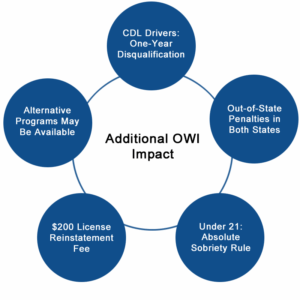 First Offense OWI for CDL Drivers in Wisconsin
First Offense OWI for CDL Drivers in Wisconsin
For CDL drivers in Wisconsin, a first OWI carries unique and much harsher consequences than those faced by non-CDL drivers. The most important difference is the blood alcohol concentration (BAC) threshold. When operating a commercial vehicle such as a company truck, the legal limit is only 0.04%, not 0.08%. Even if the offense occurs in your personal vehicle where the 0.08% limit applies, the conviction still triggers CDL penalties.
A first OWI results in a mandatory one-year CDL disqualification regardless of whether the offense happened in a commercial or personal vehicle. If hazardous materials were being transported at the time, the disqualification increases to three years. A CDL disqualification means you lose all legal authority to operate any commercial motor vehicle during that period. You cannot drive a semi-truck, bus, or any vehicle that requires a CDL until the disqualification period is over and your license is reinstated. This penalty is automatic and separate from any suspension of your regular driver’s license.
Many of the other consequences of an OWI, such as fines, license revocation of your personal driving privileges, and mandatory alcohol assessments, are similar to what non-CDL drivers face. What sets CDL drivers apart is the added penalty of disqualification, which directly targets their ability to work.
The career impact is often the most devastating consequence. A CDL disqualification almost always means the loss of your current job, since trucking companies cannot keep drivers who are not licensed to operate commercial vehicles. Insurance premiums for commercial drivers also increase substantially, and many carriers refuse to insure a driver with an OWI on their record. An OWI conviction makes it extremely difficult to find future employment in the trucking industry.
Because the stakes are so high, challenging the OWI is the only real hope of proving your innocence and protecting your livelihood so the charge does not remain on your record
First Offense Out of State OWI
If you get a first OWI in Wisconsin with an out-of-state license, you will likely face penalties in both Wisconsin and your home state. Wisconsin enforces its own fines, license revocation, and assessments, while your home state can add additional punishments such as suspending your license, adding points, or requiring classes. Because states share OWI information through national databases and compacts, it is very rare for a conviction in Wisconsin to go unnoticed back home.
For example, if you are a Minnesota resident and receive a first OWI in Wisconsin, you will face Wisconsin penalties such as fines, license revocation for 6 to 9 months, and a mandatory Alcohol and Other Drug Assessment (AODA). Minnesota can then add its own consequences, which may include a license suspension, plate impoundment, mandatory ignition interlock requirements, and higher insurance costs.
If you are an Illinois resident and receive a first OWI in Wisconsin, Wisconsin will impose its fines, revocation, and AODA requirements. Illinois can then add penalties such as a one-year license suspension, points on your driving record, higher insurance rates, and mandatory alcohol education classes.
First Offense OWI Under 21
In Wisconsin, if you are under 21, you are held to the absolute sobriety rule, meaning any detectable alcohol in your system is against the law. In addition to the minimum $200 fine and the automatic three-month suspension of your driver’s license, you will face other serious consequences. You will receive two separate citations, one for Operating While Intoxicated (OWI) and another for Prohibited Alcohol Concentration (PAC), which makes the penalties more severe. Demerit points will be added to your driving record, leading to higher insurance costs. An OWI in Wisconsin also stays on your permanent driving and arrest record, which can be seen by schools, universities, and future employers, limiting career and education opportunities. On top of this, you will have to pay additional costs such as driver improvement surcharges, reinstatement fees to the DMV, and inflated insurance premiums for years. Courts often require a mandatory Alcohol and Other Drug Assessment (AODA), and you may also be ordered to attend safe driving classes.
Alternatives to a First Offense OWI Conviction
Even in serious first-offense cases, alternatives to a conviction may be available. Depending on your situation, your attorney may be able to pursue options such as the Deferred Prosecution Program, which can result in dismissal after completing education, treatment, or community service; OWI Treatment Court, which emphasizes recovery and may reduce jail time; or alternatives to jail such as electronic monitoring or house arrest. These opportunities are not guaranteed, and not all counties in Wisconsin offer them, but in the right case they can significantly lessen the long-term impact of a first offense OWI conviction.
Winning Strategies for First-Offense OWI Charges in Wisconsin
Just because you were accused of a crime does not mean you will be found guilty or have to live with the lasting consequences. A first-offense OWI or APC charge in Wisconsin can be fought by challenging the evidence at every stage of the case. Many cases are won by exposing illegal traffic stops, lack of probable cause, and procedural errors by law enforcement. Breath and blood testing records can be challenged and excluded if issues are found with calibration, handling, or chain of custody. The accuracy of field sobriety tests can also be disputed, along with medical or physical conditions that may resemble signs of impairment. Through careful preparation, strategic motions to suppress, and a clear presentation of the client’s side of the story, these cases can often be successfully defended, protecting freedom, dignity, and the ability to move forward as if it never happened.
Below are just a few examples of OWI cases that were successfully challenged, leading to favorable results:
First Offense OWI: Not Guilty Verdict
A driver was pulled over after briefly touching the fog line. Poor lighting and uneven pavement affected their balance during field tests. Video evidence later revealed inconsistencies in the officer’s account, leading the jury to find the driver not guilty of OWI.
Faulty Breath Test: Case Dismissed
A nurse was stopped for slight lane drift after a long shift. The breath test showed a marginally elevated result, but evidence proved the testing device was not properly calibrated and procedures were not followed. The case was dismissed.
First Offense OWI: Reduced
A college student stopped after leaving a friend’s home. The defense successfully challenged the legality of the stop and procedural errors, leading to a favorable outcome.
First Offense OWI: Dismissed
A business owner arrested for OWI requested an independent chemical test, a right under Wisconsin law, but the officer failed to provide one. This violation led the court to dismiss the charge entirely before trial.
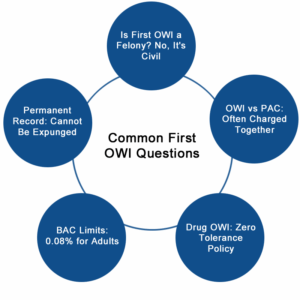 OWI First Offense FAQS
OWI First Offense FAQS
Is a First Offense OWI a Felony in Wisconsin?
In Wisconsin, a first OWI is usually treated like a serious ticket rather than a crime or felony. It’s handled in traffic court, and most people don’t face jail time for that first offense. However, the penalties get tougher with repeat offenses. A second OWI can be charged as a felony if you have a child under 16 in the car. By the fourth offense, an OWI is always a felony, no matter what. And if an OWI causes serious injury or death, it will be charged as a felony with severe consequences.
Is a Wisconsin OWI and PAC the same thing? What are the consequences for a first offense PAC in Wisconsin?
In Wisconsin, drunk driving charges can come in two forms: Operating While Intoxicated (OWI) and Operating with a Prohibited Alcohol Concentration (PAC). An OWI charge is based on evidence that a driver was impaired by alcohol or drugs, such as erratic driving or failing field sobriety tests. A PAC charge, on the other hand, is based only on having a blood alcohol concentration (BAC) at or above the legal limit, which is 0.08% for adults or 0.00% for drivers under 21 under the state’s absolute sobriety law. Because of this, it is common for drivers to be charged with both OWI and PAC at the same time.
A first offense PAC in Wisconsin is treated the same as a first OWI. It is a civil violation rather than a criminal conviction, but the penalties are still significant. You can face fines of $150 to $300 plus court costs, and your driver’s license will be revoked for 6 to 9 months. You must also complete a mandatory Alcohol and Other Drug Assessment (AODA), which can lead to further classes or treatment at your own expense. While jail is not imposed for a first offense PAC, the conviction becomes part of your permanent driving and arrest record, which can raise insurance rates and create long-term consequences for school, employment, and professional opportunities.
Can You Get an OWI for Drugs in Wisconsin?
In Wisconsin, OWI does not apply only to alcohol. You can be charged if you drive under the influence of illegal drugs, prescription medication, or even over-the-counter drugs that impair your ability to drive safely. The state has a zero-tolerance policy for controlled substances, meaning any detectable amount in your blood can lead to an OWI. Drugs commonly involved include prescription medication, marijuana, cocaine, methamphetamine, heroin, opioids, benzodiazepines, and certain sleep aids or pain medications. The penalties are the same as alcohol-related OWI, with harsher consequences if a child is in the car or if there is an accident, injury, or death.
How Much Alcohol Does It Take to Be “Over the Limit” in Wisconsin?
In Wisconsin, the legal blood alcohol concentration (BAC) limit is 0.08% for most drivers age 21 and older. For commercial drivers, the limit is 0.04%. For drivers under 21, the state follows an absolute sobriety law, which means any detectable amount of alcohol is illegal.
How quickly you reach 0.08% depends on your weight, gender, how fast you drink, whether you have eaten, and your metabolism. On average, it may take as little as one to two drinks in an hour for an adult to reach the legal limit. Since every person processes alcohol differently, there is no safe or reliable number of drinks before driving.
How Long Will a First Offense OWI Stay on My Record in Wisconsin?
In Wisconsin, a first offense OWI stays on your driving record permanently. It cannot be removed or expunged, and it will count against you if you are ever arrested again for drunk driving. For sentencing purposes, Wisconsin uses a lifetime look-back period, which means any prior OWI can be used to increase penalties for a new offense, no matter how long ago it happened. Even though a first offense OWI is classified as a civil violation (not a criminal misdemeanor) in most cases, it still creates a permanent mark on your record that can affect insurance, employment, and future legal consequences.
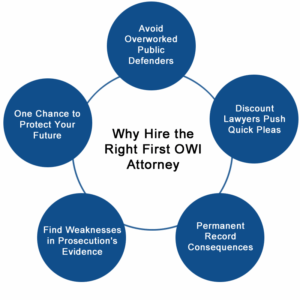 Investing in an OWI Lawyer for Your First Offense
Investing in an OWI Lawyer for Your First Offense
You don’t want to gamble with a public defender or a discount attorney who may simply push you into a plea deal and leave you with a first offense OWI on your permanent record. Public defenders are often overworked and juggling hundreds of cases, which means they rarely have the time to fully investigate your case or build a strong defense. Cheap discount lawyers may promise a low fee, but in reality they are only interested in your money and often pressure clients at the last minute to plead guilty instead of fighting for a better outcome.
Even though a first offense in Wisconsin is typically a civil violation, the consequences are serious and long-lasting. Fines, license revocation, mandatory assessments, higher insurance premiums, and a permanent mark on your record can all follow you for life.
The difference between an experienced OWI defense attorney and a bargain option can determine your future. A skilled defense lawyer knows how to expose weaknesses in the prosecution’s evidence, from the traffic stop to the field sobriety tests to the breath or blood results. That difference can mean dismissal, reduction, or a far better outcome than a quick guilty plea.
This is not the time to take chances. A first offense OWI is your one chance to keep your record as clean as possible and protect your freedom, career, and future opportunities. By investing in the right defense now, you will look back knowing you made the choice that protected your life going forward.
Schedule a Free Legal Consultation
Many people underestimate how serious a first offense OWI can be until it is too late. A conviction can limit career paths, take away your license for months, require an ignition interlock device in some cases, increase insurance costs for years, and permanently stain your record.
That is why scheduling a free legal consultation is so important. In just 30 to 60 minutes, whether in person, over the phone, or online, you can review your case with an experienced defense team, ask questions, and begin building a strategy to fight your first offense OWI and pursue the best possible outcome. Submit your contact information below to get started.
Call (608) 490-5779 or Schedule a Free Case Evaluation Online

